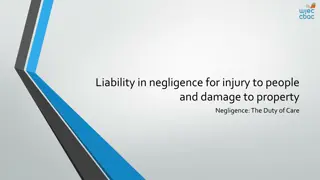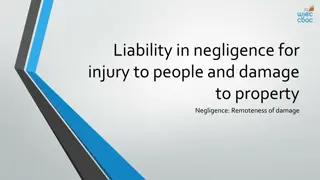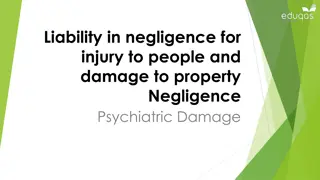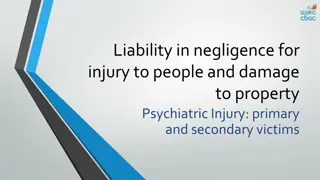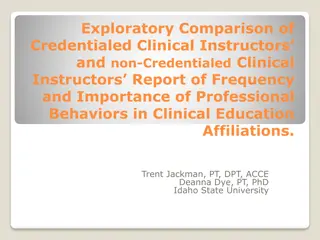A CLINICAL NEGLIGENCE OVERVIEW
Clinical negligence claims require claimants to establish duty of care, breach of duty, causation, and more. Healthcare workers owe patients a duty of care to avoid physical injuries. The law on advice has evolved with cases like Montgomery, emphasizing the importance of informed consent. Recent legal developments, such as the case of Paul v. The Royal Wolverhampton NHS Trust, have further clarified duty of care in negligence claims, especially for secondary victims.
Download Presentation

Please find below an Image/Link to download the presentation.
The content on the website is provided AS IS for your information and personal use only. It may not be sold, licensed, or shared on other websites without obtaining consent from the author.If you encounter any issues during the download, it is possible that the publisher has removed the file from their server.
You are allowed to download the files provided on this website for personal or commercial use, subject to the condition that they are used lawfully. All files are the property of their respective owners.
The content on the website is provided AS IS for your information and personal use only. It may not be sold, licensed, or shared on other websites without obtaining consent from the author.
E N D
Presentation Transcript
A CLINICAL NEGLIGENCE OVERVIEW CRAIG PURSHOUSE, UNIVERSITY OF LIVERPOOL, SCHOOL OF LAW
CONTENTS Legal tests for clinical negligence claims and update The standard of care in pandemic conditions Clinical negligence reform
NEGLIGENCE Claimants must establish that: The defendant owed them a duty of care; That the defendant breached this duty (fell below the standard of care). That the breach was the factual and legal cause of C s injury.
NEGLIGENCE Duty of care: healthcare workers and hospitals owe patients a duty of care to avoid causing physical injuries (Darnley). Breach: the standard of the reasonable professional. Must comply with a responsible body of medical opinion and that opinion must be capable of withstanding logical analysis (Bolam/Bolitho). The test for negligent advice/information non-disclosure is now different. Causation: D s breach of duty must have caused or contributed to the injury (factual causation). The injury must be within the scope of D s duty and not too remote, with no intervening acts breaking the chain of causation (legal causation).
DUTY OF CARE It is well-established that doctors owe their patients a duty of care. What about situations where clinical negligence causes psychiatric injuries for non-patients? Claims by secondary victims: Recognised psychiatric injury; psychiatric injury reasonably foreseeable; close ties of love and affection; close in proximity to the accident/immediate aftermath; witnessed the sudden shocking event with one s unaided senses.
DUTY OF CARE Paul v The Royal Wolverhampton NHS Trust [2022] EWCA Civ 12. Two daughters witnessed their father s death from a heart attack following earlier alleged clinical negligence. Three conjoined appeals: Paul, Polmear and Purchase. Taylor v Novo: C could not claim when the injury to the primary victim was separate to the initial accident/shocking event. Paul: C cannot claim when the horrific event is removed from the initial negligence.
THE NEW LAW ON ADVICE: MONTGOMERY. The doctor s duty of care encompasses diagnosis, advice and treatment. Negligent advice is now governed by Montgomery. A doctor is under a duty to take reasonable care to ensure that the patient is aware of any material risks involved in any recommended treatment, and of any reasonable alternative or variant treatments. The test of materiality is not assessed by peer opinion but from the standpoint of the reasonable patient, or the particular patient where the doctor should be reasonably aware that the patient would attach significance to that risk.
A RECENT APPLICATION OF MONTGOMERY Plant v El-Amir (2020): C partially sighted but vision worse in her left eye. She wanted surgery in that eye to help her read but she was persuaded to have surgery on both eyes. D was negligent in failing to advise her that surgery on her better vision eye would not enable her to achieve her goal of reading again and carried risks of complications.
CAUSATION The but for test. Material contribution to injury. Divisible and indivisible injuries. Can the material contribution to injury test apply to indivisible injuries?
CAUSATION Thorley v Sandwell and West Birmingham NHS Trust [2021] EWHC 2604 C diagnosed with atrial fibrillation in 2002 and prescribed daily warfarin. 2005: arrangements for an angiogram. C advised to stop taking warfarin for 4 days prior. Following procedure, advised to wait 2 days before re-starting warfarin at 3mg. C suffered stroke resulting in severe physical and cognitive disability. C argued that should only have stopped taking warfarin three days before the procedure and should have recommenced one day afterwards. Also, argued that the dose should have been 3.5mg.
CAUSATION Soole J held that there was no breach of duty on these facts and that the claimant would have suffered the injury in any event on normal but for principles. Soole J also held that the material contribution to injury test did not apply when there was a single tortfeasor and an indivisible injury. Soole J followed MOD v AB and Heneghan v Manchester Dry Docks. However, other leading cases, such as Williams v Bermuda Hospital Board indicate that the test can apply to indivisible injuries. Another recent medical negligence case Davies v Frimley Health NHS Foundation Trust also indicates that the material contribution to injury test only applies to indivisible injuries.
THE STANDARD OF CARE IN PANDEMIC CONDITIONS Increased complexity Pressure on resources New/returning practitioners
THE OBJECTIVE STANDARD Patients are entitled to have standards of care upheld even by practitioners of relative inexperience Wilsher v Essex AHA [1987] CA - the standard of care is to be measured by the task, not the attributes of the person undertaking it. To discharge their duty of care, inexperienced colleagues expected to seek advice of more experienced colleagues where necessary (Wilsher). Confirmed by CA in FB v Princess Alexandra Hospital NHS Trust [2017] - where a doctor in a particular post fails to exercise the degree of skill required for the task, they will breach the standard of care. Inexperience will not lower the standard and nor will more than average experience elevate it. Context free?
FACTORS an emergency may overburden the available resources, and, if an individual is forced by circumstances to do too many things at once, the fact that he does one of them incorrectly should not lightly be taken as negligence (Wilsher). Mulholland [2015] - busy A&E doctors do not have the luxury of long and mature consideration. They take decisions at short notice in a pressurised environment the standard of care must be calibrated in a manner reflecting reality. [101]
PROFESSIONAL GUIDANCE BMA - doctors are unlikely to be criticized for care where their decisions are reasonable in the circumstances GMC -All our ethical guidance continues to apply as far as is practical in the circumstances. The primary requirement for all doctors is to react responsibly and reasonably to the circumstances they face.
IMMUNITY FROM SUIT? Yes No Memories about the dire conditions may fade Indemnity has been extended to cover covid- 19 care HCPs have made personal sacrifices to continue to provide care Undermines entitlement to reasonable standard of care CN claims cause major anxiety and distress Context will be taken into account hard to establish CN except in egregious cases Compensation is further drain on NHS resources HCPs are patients too
REFORM Health and Social Care Committee report on NHS Litigation Reform. NHS spends over 2billion compensating patients who have suffered harm during treatment. A process that is supposed to deliver justice and incentivise improvements fails to do either: lessons are rarely learned and for families accessing compensation is slow, adversarial, stressful, and often bitter. Snowballing costs are not related to a decline in safety. Administrative rather than adversarial system (achieved in stages), based on agreement that correct procedures have not been followed and system failure rather than the higher threshold of fault by the hospital or a clinician. Result: wider pool of claimants but not necessarily more expensive. A culture of learning rather than blame.
REFORM Administrative rather than adversarial system (achieved in stages), based on agreement that correct procedures have not been followed and system failure rather than the higher threshold of fault by the hospital or a clinician. A wider pool of claimants but not necessarily more expensive. A culture of learning rather than blame. Compensation could be equally generous. However, some cost saving measures: compensation based on what is needed to top-up NHS care rather than assuming all care will be provided privately; using parental income for the assessment of lost earnings for children under 18 is unfair. Six month investigations.
THANK YOU ANY QUESTIONS?
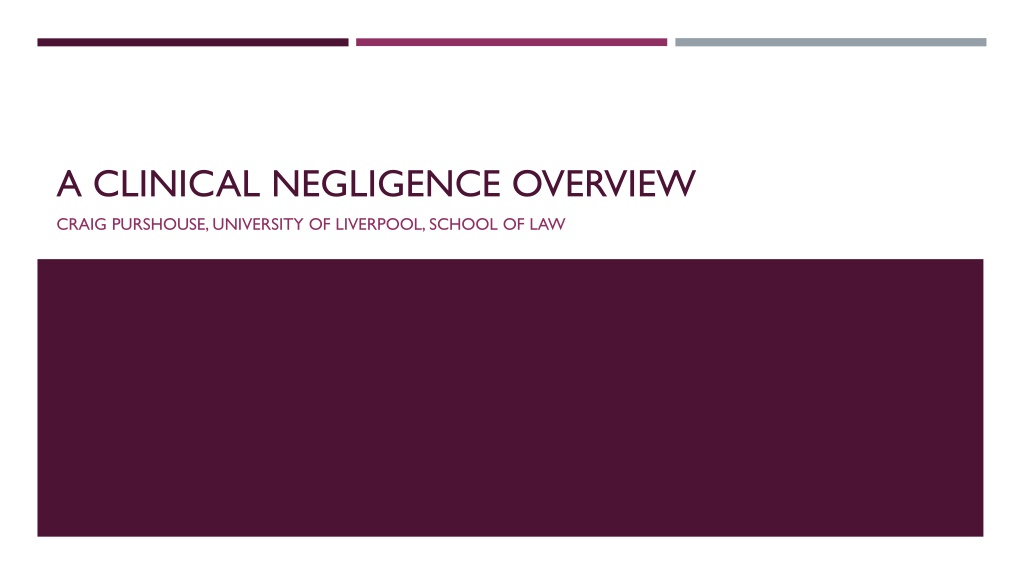



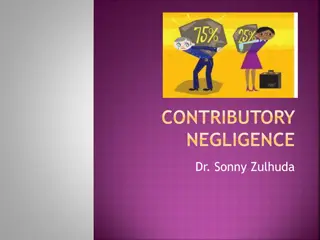
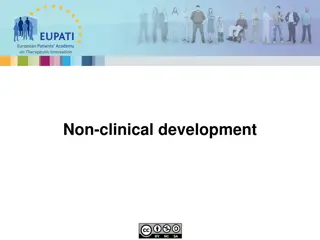
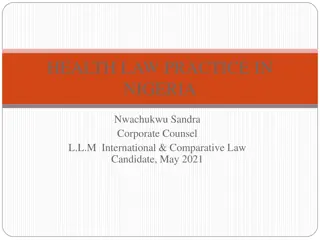
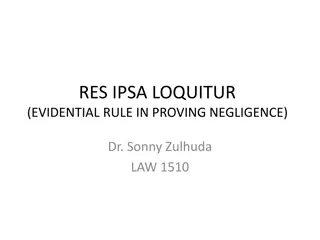
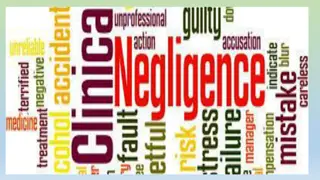

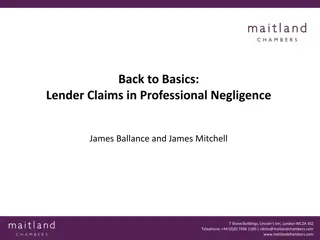




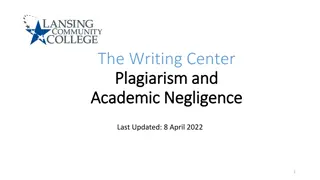

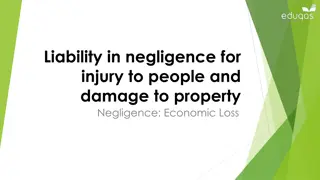
![Negligence Liability in Donoghue v. Stevenson [1932]](/thumb/198881/negligence-liability-in-donoghue-v-stevenson-1932.jpg)
